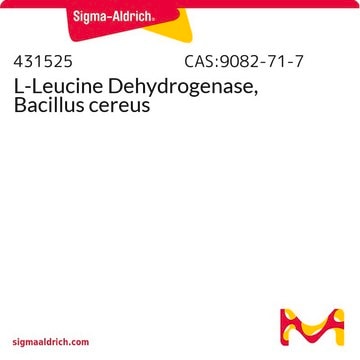L5135
L-Leucine Dehydrogenase from Bacillus cereus
lyophilized powder, ≥60 units/mg protein
Synonym(s):
L-Leucine:NAD+ oxidoreductase (deaminating)
Sign Into View Organizational & Contract Pricing
All Photos(1)
About This Item
CAS Number:
MDL number:
UNSPSC Code:
12352204
NACRES:
NA.54
Recommended Products
form
lyophilized powder
Quality Level
specific activity
≥60 units/mg protein
mol wt
245 kDa
storage temp.
−20°C
Looking for similar products? Visit Product Comparison Guide
General description
L-Leucine Dehydrogenase is a member of the amino acid dehydrogenase family.
Application
L-Leucine Dehydrogenase from Bacillus cereus has been used to determine the branched-chain amino acids (BCAA) spectrophotometrically in serum samples.
Biochem/physiol Actions
Leucine Dehydrogenase is a nicotinamide adenine dinucleotide hydrogen (NADH)-dependent oxidoreductase. It is involved in catalyzing the reductive amination of aliphatic 2-oxo-acids to their respective L-amino acids.
Unit Definition
One unit will convert 1.0 μmole of L‑leucine to α-ketoisocaproate per min at pH 10.5 at 37 °C.
Other Notes
contains lysine
Storage Class Code
11 - Combustible Solids
WGK
WGK 3
Flash Point(F)
Not applicable
Flash Point(C)
Not applicable
Personal Protective Equipment
dust mask type N95 (US), Eyeshields, Gloves
Certificates of Analysis (COA)
Search for Certificates of Analysis (COA) by entering the products Lot/Batch Number. Lot and Batch Numbers can be found on a product’s label following the words ‘Lot’ or ‘Batch’.
Already Own This Product?
Find documentation for the products that you have recently purchased in the Document Library.
T Stoyan et al.
Journal of biotechnology, 54(1), 77-80 (1997-04-04)
The L-leucine dehydrogenase gene from Bacillus cereus (DSM 626) was cloned from a partial genomic library and sequenced. The open reading frame has 1101 bp and codes for a protein of 39.9 kDa. The deduced amino acid sequence of the
T Oikawa et al.
Biochemical and biophysical research communications, 280(4), 1177-1182 (2001-02-13)
X-ray crystallographic studies revealed that various amino acid dehydrogenases fold into two domains in each subunit, a substrate-binding domain and an NAD(P)(+)-binding domain (Baker, P. J., Turnbull, A. P., Sedelnikova, S. E., Stillman, T. J., and Rice, D. W. (1995)
N Kiba et al.
Journal of chromatography. A, 724(1-2), 355-357 (1996-02-16)
A liquid chromatographic system with a co-immobilized leucine dehydrogenase-NADH oxidase reactor is described for the determination of branched-chain amino acids such as I-leucine, I-isoleucine and I-valine. The enzymes were simultaneously immobilized on tresylate-containing poly(vinyl alcohol) beads. The separation was achieved
Emily P Balskus et al.
Journal of the American Chemical Society, 131(41), 14648-14649 (2009-09-29)
Previous studies of the biosynthetic enzymes involved in the assembly of scytonemin (1), a cyanobacterial sunscreen, have identified beta-ketoacid 2 as an important intermediate that is produced by ThDP-dependent enzyme ScyA. We now report that ScyC, previously annotated as a
Junping Zhou et al.
Biotechnology journal, 14(3), e1800253-e1800253 (2018-07-28)
Unnatural amino acids (UAAs) play a key role in modern medicinal chemistry such as small molecules and peptide-based drugs with fast-growing markets. Low efficiency for natural enzymes including leucine dehydrogenase (LeuDH, EC1.4.1.9) are one major challenge for UAA production. Here
Our team of scientists has experience in all areas of research including Life Science, Material Science, Chemical Synthesis, Chromatography, Analytical and many others.
Contact Technical Service






